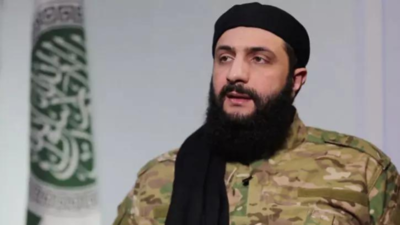
Abu Mohammed al-Jolani is the leader of Hayat Tahrir al-Sham (HTS), who stepped into the spotlight after his Islamist alliance led a decisive offensive that rebels claim has toppled President Bashar al-Assadending five decades of Baath Party rule in Syria.
Jolani, whose real name is Ahmed al-Sharaa, has a controversial past. His group, rooted in Syria’s branch of Al-Qaeda, has been accused of extremist activities. However, he has recently adopted a more moderate image while leading the fight to oust Assad.
On Sunday, as rebels entered Damascus, Jolani ordered fighters to stay away from public institutions to maintain order.
Earlier this week, he had stated the primary goal of the campaign: “to overthrow Assad.” Thirteen years after Assad’s violent crackdown on pro-democracy protests sparked Syria’s civil war, the rebels announced that Assad had fled the country, declaring Damascus free of the “tyrant.”
Steps into spotlight
Once known for operating from the shadows, Jolani has now taken a public role. During the offensive, he appeared in Aleppo, Syria’s second-largest city, after it was captured by rebels for the first time in the war.
He has stopped wearing the traditional turban often linked to jihadists and now opted for military fatigues and a khaki shirt, presenting himself as more practical and adaptable.
During a visit to Aleppo’s citadel last Wednesday, Jolani was seen waving to crowds, a stark contrast to his earlier reclusive persona. He also began signing statements under his real name, a shift interpreted by some as an attempt to align himself with his roots and distance himself from his militant past.
‘Assad Defeated’: Rebels Declare ‘Syria Is Free’ In Damascus; Syrian PM Addresses Nation
Born in 1982 to a well-off family in Damascus’ Mazzeh district, Jolani’s path to jihadism reportedly began after the September 11, 2001 attacks. According to the Middle East Eye, he was inspired by the attackers and began attending secret sermons in Damascus. He later joined Al-Qaeda in Iraq and was detained for five years before returning to Syria in 2011 to found the Al-Nusra FrontAl-Qaeda’s Syrian branch.
Jolani broke ties with Al-Qaeda in 2016, a move he claimed was meant to prevent Western retaliation. Despite this, HTS remains classified as a terrorist organization by Western governments.
‘Smart thing to do’
Jolani’s leadership has drawn mixed views. Some see him as pragmatic, while others view him as an opportunist. “In 2014, he was at the height of his radicalism,” said Thomas Pierret, an expert on political Islam. “Since then, he has moderated his rhetoric.”
Under his leadership, HTS consolidated power in Idlib province by merging with rival Islamist groups in 2017. The group established a civilian government in the region, often accused of brutal crackdowns on dissent. The UN has classified some of HTS’s actions as war crimes.
Despite his past, Jolani has sought to reassure residents of newly “liberated” areas, including Aleppo, which is home to a significant Christian minority. Speaking to residents, he promised no harm would come to them under his administration. He also urged his fighters to maintain security in captured areas.
“I think it’s primarily just good politics,” said Aron, a fellow at the Century International think tank. “The less local and international panic you have and the more Jolani seems like a responsible actor instead of a toxic jihadi extremist, the easier his job will become. Is it totally sincere? Surely not,” he added. “But it’s the smart thing to say and do right now.”
Follow live updates



















